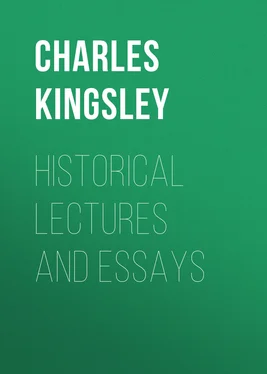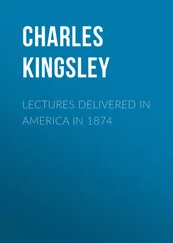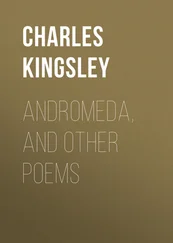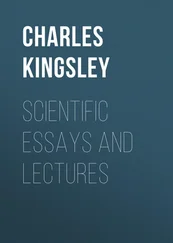Charles Kingsley - Historical Lectures and Essays
Здесь есть возможность читать онлайн «Charles Kingsley - Historical Lectures and Essays» — ознакомительный отрывок электронной книги совершенно бесплатно, а после прочтения отрывка купить полную версию. В некоторых случаях можно слушать аудио, скачать через торрент в формате fb2 и присутствует краткое содержание. Жанр: foreign_prose, История, foreign_edu, foreign_antique, на английском языке. Описание произведения, (предисловие) а так же отзывы посетителей доступны на портале библиотеки ЛибКат.
- Название:Historical Lectures and Essays
- Автор:
- Жанр:
- Год:неизвестен
- ISBN:нет данных
- Рейтинг книги:5 / 5. Голосов: 1
-
Избранное:Добавить в избранное
- Отзывы:
-
Ваша оценка:
- 100
- 1
- 2
- 3
- 4
- 5
Historical Lectures and Essays: краткое содержание, описание и аннотация
Предлагаем к чтению аннотацию, описание, краткое содержание или предисловие (зависит от того, что написал сам автор книги «Historical Lectures and Essays»). Если вы не нашли необходимую информацию о книге — напишите в комментариях, мы постараемся отыскать её.
Historical Lectures and Essays — читать онлайн ознакомительный отрывок
Ниже представлен текст книги, разбитый по страницам. Система сохранения места последней прочитанной страницы, позволяет с удобством читать онлайн бесплатно книгу «Historical Lectures and Essays», без необходимости каждый раз заново искать на чём Вы остановились. Поставьте закладку, и сможете в любой момент перейти на страницу, на которой закончили чтение.
Интервал:
Закладка:
The cause is plain. The conquest of England by the Normans was not one of those conquests of a savage by a civilised race, or of a cowardly race by a brave race, which results in the slavery of the conquered, and leaves the gulf of caste between two races—master and slave. That was the case in France, and resulted, after centuries of oppression, in the great and dreadful revolution of 1793, which convulsed not only France but the whole civilised world. But caste, thank God, has never existed in England, since at least the first generation after the Norman conquest.
The vast majority, all but the whole population of England, have been always free; and free, as they are not where caste exists to change their occupations. They could intermarry, if they were able men, into the ranks above them; as they could sink, if they were unable men, into the ranks below them. Any man acquainted with the origin of our English surnames may verify this fact for himself, by looking at the names of a single parish or a single street of shops. There, jumbled together, he will find names marking the noblest Saxon or Angle blood—Kenward or Kenric, Osgood or Osborne, side by side with Cordery or Banister—now names of farmers in my own parish—or other Norman-French names which may be, like those two last, in Battle Abbey roll—and side by side the almost ubiquitous Brown, whose ancestor was probably some Danish or Norwegian house-carle, proud of his name Biorn the Bear, and the ubiquitous Smith or Smythe, the Smiter, whose forefather, whether he be now peasant or peer, assuredly handled the tongs and hammer at his own forge. This holds true equally in New England and in Old. When I search through (as I delight to do) your New England surnames, I find the same jumble of names—West Saxon, Angle, Danish, Norman, and French-Norman likewise, many of primæval and heathen antiquity, many of high nobility, all worked together, as at home, to form the Free Commoners of England.
If any should wish to know more on this curious and important subject, let me recommend them to study Ferguson’s “Teutonic Name System,” a book from which you will discover that some of our quaintest, and seemingly most plebeian surnames—many surnames, too, which are extinct in England, but remain in America—are really corruptions of good old Teutonic names, which our ancestors may have carried in the German Forest, before an Englishman set foot on British soil; from which he will rise with the comfortable feeling that we English-speaking men, from the highest to the lowest, are literally kinsmen. Nay, so utterly made up now is the old blood-feud between Norseman and Englishman, between the descendants of those who conquered and those who were conquered, that in the children of our Prince of Wales, after 800 years, the blood of William of Normandy is mingled with the blood of the very Harold who fell at Hastings. And so, by the bitter woes which followed the Norman conquest was the whole population, Dane, Angle, and Saxon, earl and churl, freeman and slave, crushed and welded together into one homogeneous mass, made just and merciful towards each other by the most wholesome of all teachings, a community of suffering; and if they had been, as I fear they were, a lazy and a sensual people, were taught
That life is not as idle ore,
But heated hot with burning fears,
And bathed in baths of hissing tears,
And battered with the strokes of doom
To shape and use.
But how did these wild Vikings become Christian men? It is a long story. So stanch a race was sure to be converted only very slowly. Noble missionaries as Ansgar, Rembert, and Poppo, had worked for 150 years and more among the heathens of Denmark. But the patriotism of the Norseman always recoiled, even though in secret, from the fact that they were German monks, backed by the authority of the German emperor; and many a man, like Svend Fork-beard, father of the great Canute, though he had the Kaiser himself for godfather, turned heathen once more the moment he was free, because his baptism was the badge of foreign conquest, and neither pope nor kaiser should lord it over him, body or soul. St. Olaf, indeed, forced Christianity on the Norse at the sword’s point, often by horrid cruelties, and perished in the attempt. But who forced it on the Norsemen of Scotland, England, Ireland, Neustria, Russia, and all the Eastern Baltic? It was absorbed and in most cases, I believe, gradually and willingly, as a gospel and good news to hearts worn out with the storm of their own passions. And whence came their Christianity? Much of it, as in the case of the Danes, and still more of the French Normans, came direct from Rome, the city which, let them defy its influence as they would, was still the fount of all theology, as well as of all civilisation. But I must believe that much of it came from that mysterious ancient Western Church, the Church of St. Patric, St. Bridget, St. Columba, which had covered with rude cells and chapels the rocky islets of the North Atlantic, even to Iceland itself. Even to Iceland; for when that island was first discovered, about A.D. 840, the Norsemen found in an isle, on the east and west and elsewhere, Irish books and bells and wooden crosses, and named that island Papey, the isle of the popes—some little colony of monks, who lived by fishing, and who are said to have left the land when the Norsemen settled in it. Let us believe, for it is consonant with reason and experience, that the sight of those poor monks, plundered and massacred again and again by the “mailed swarms of Lochlin,” yet never exterminated, but springing up again in the same place, ready for fresh massacre, a sacred plant which God had planted, and which no rage of man could trample out—let us believe, I say, that that sight taught at last to the buccaneers of the old world that there was a purer manliness, a loftier heroism, than the ferocious self-assertion of the Berserker, even the heroism of humility, gentleness, self-restraint, self-sacrifice; that there was a strength which was made perfect in weakness; a glory, not of the sword but of the cross. We will believe that that was the lesson which the Norsemen learnt, after many a wild and blood-stained voyage, from the monks of Iona or of Derry, which caused the building of such churches as that which Sightrys, king of Dublin, raised about the year 1030, not in the Norse but in the Irish quarter of Dublin: a sacred token of amity between the new settlers and the natives on the ground of a common faith. Let us believe, too, that the influence of woman was not wanting in the good work—that the story of St. Margaret and Malcolm Canmore was repeated, though inversely, in the case of many a heathen Scandinavian jarl, who, marrying the princely daughter of some Scottish chieftain, found in her creed at last something more precious than herself; while his brother or his cousin became, at Dublin or Wexford or Waterford, the husband of some saffron-robed Irish princess, “fair as an elf,” as the old saying was; some “maiden of the three transcendent hues,” of whom the old book of Linane says:
Red as the blood which flowed from stricken deer,
White as the snow on which that blood ran down,
Black as the raven who drank up that blood;
—and possibly, as in the case of Brian Boru’s mother, had given his fair-haired sister in marriage to some Irish prince, and could not resist the spell of their new creed, and the spell too, it may be, of some sister of theirs who had long given up all thought of earthly marriage to tend the undying fire of St. Bridget among the consecrated virgins of Kildare.
I am not drawing from mere imagination. That such things must have happened, and happened again and again, is certain to anyone who knows, even superficially, the documents of that time. And I doubt not that, in manners as well as in religion, the Norse were humanised and civilised by their contact with the Celts, both in Scotland and in Ireland. Both peoples had valour, intellect, imagination: but the Celt had that which the burly angular Norse character, however deep and stately, and however humorous, wanted; namely, music of nature, tenderness, grace, rapidity, playfulness; just the qualities, combining with the Scandinavian (and in Scotland with the Angle) elements of character which have produced, in Ireland and in Scotland, two schools of lyric poetry second to none in the world.
Читать дальшеИнтервал:
Закладка:
Похожие книги на «Historical Lectures and Essays»
Представляем Вашему вниманию похожие книги на «Historical Lectures and Essays» списком для выбора. Мы отобрали схожую по названию и смыслу литературу в надежде предоставить читателям больше вариантов отыскать новые, интересные, ещё непрочитанные произведения.
Обсуждение, отзывы о книге «Historical Lectures and Essays» и просто собственные мнения читателей. Оставьте ваши комментарии, напишите, что Вы думаете о произведении, его смысле или главных героях. Укажите что конкретно понравилось, а что нет, и почему Вы так считаете.












